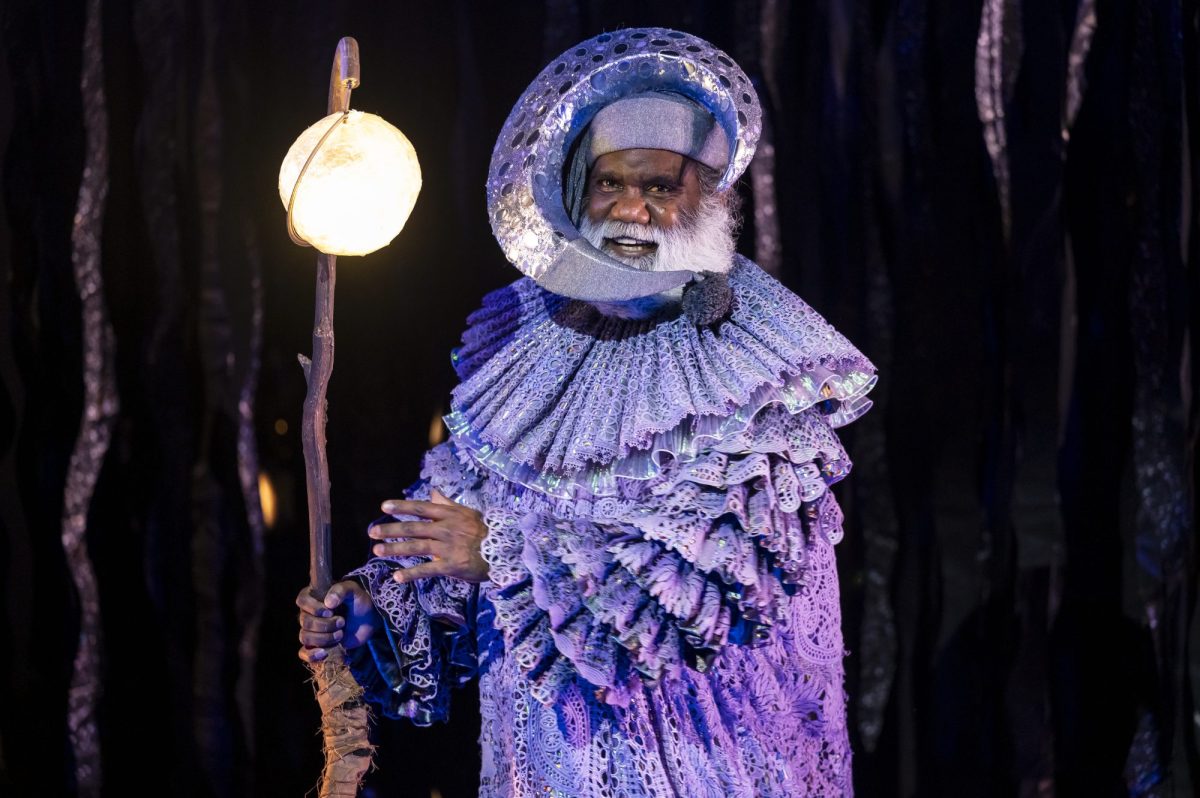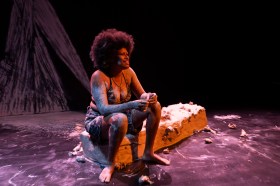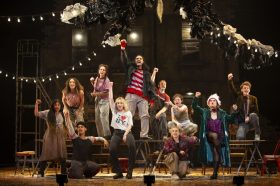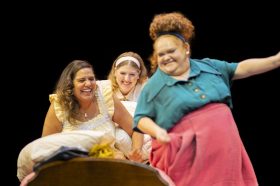To describe the opening event as merely ’emotional’ undervalues its profound significance in marking a historic milestone for First Nations voices. In a groundbreaking collaboration, ILBIJERRI Theatre Company and Melbourne Theatre Company (MTC) present Blak in the Room, a vibrant celebration of storytelling by Blak women.
This event offered a captivating preview of the season’s offerings, which include an art exhibition, live music, food, a weaving workshop, conversations and, at its heart, three remarkable stage plays by emerging Blak women storytellers.
In her impassioned opening speech, Amy Sole, Creative Associate at ILBIJERRI, emphasised the monumental importance of the partnership between ILBIJERRI, which has been in existence for more than 30 years and the MTC. She articulated how this collaboration lays a robust foundation for the preservation of First Nations stories, encapsulating the essential “gift of hearing our stories” and the power of sharing the ‘room’ with those who reflect one’s identity.
Inspired by the question ‘Who was in the room?’, Blak in the Room stands as a testament to collaboration, featuring 26 artists, a dedicated design team and three diverse stage plays. Sole also highlighted the vital role of allyship, exemplified by MTC’s Artistic Director and co-CEO Anne-Louise Sarks, whose approach does not impose limitations, saying, “She didn’t give me permission, but she didn’t stand in the way” – thus presenting a supportive environment.
This initiative not only amplifies Blak voices, but also invites audiences into a transformative space of understanding and connection.
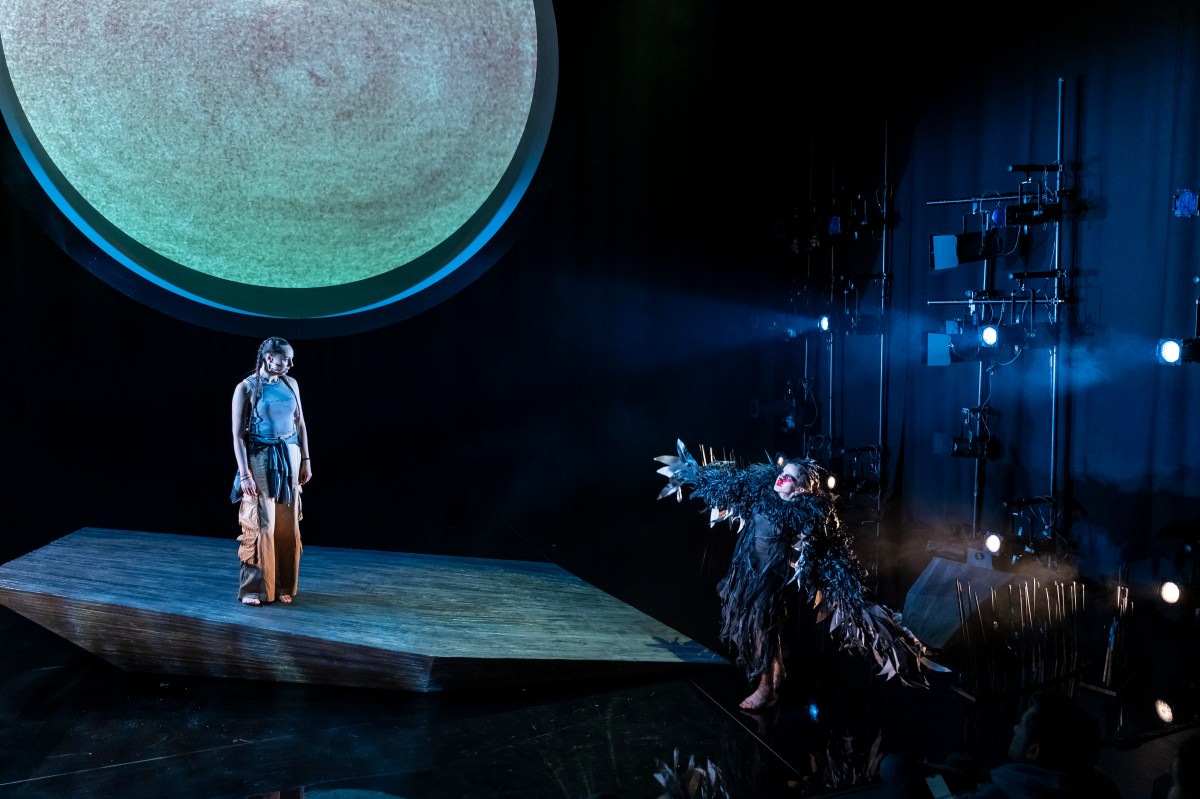
Gunawarra Re-creation
Kicking off the day was Gunawarra Re-creation, a poignant exploration of pain, grief, healing and the myriad ways in which we process these complex emotions. Written by Isobel Morphy-Walsh, a proud Nirim Baluk woman who employs a variety of media and formats to weave story into both performance and visual art in her artistic practice.
As the apt season opener, Morphy-Walsh’s debut play invites audiences into Aboriginal creation stories, or Dreamtime narratives, which are about the creation of the world by ancestor spirits. The production is directed by the acclaimed Rachael Maza AM, Artistic Director of ILBIJERRI Theatre Company and a well-known actor in her own right.
Setting her play at a watering hole, which is an essential element of Aboriginal culture, Morphy-Walsh weaves a tale that intertwines the past, present and future. Here, Murrun, portrayed by the Naarm-based award-winning cross-disciplinary performance artist, Carly Sheppard encounters her old friend, Gunawarra – the Crow, played by Nirim Baluk woman Hannah Morphy-Walsh. As Murrun grapples with a cascade of frustrations born from painful experiences including physical violence, colonisation, family disconnection and generational trauma, her friend sows a vital idea: to change the narrative and reclaim her story. This transformative notion fosters a three generation matriarchal connection within Murrun’s family, particularly with her wise Auntie Aggie, portrayed by Wongutha Nadju woman Melodie Reynolds-Diarra, whose role is pivotal in the healing journey of Murrun’s mother, Ru, played by Noongar Whadjuk Ballardong woman, Kristel-Lee Kickett.
The production is visually striking, featuring black-and-white stop-motion graphics of a flying crow gliding above a sleek riverbank adorned with silvery grasses. From the moment the audience joins the cast at the watering hole, they are swept into the emotional current of the story. The interplay of score, soundscapes and lighting creates a dynamic atmosphere that balances tension and tenderness, guiding viewers through the narrative with grace. The meticulous costume – in particular the glorious feathers adorning Waa the crow – and set design enhance the performance, fostering a sense of harmony throughout.
Ultimately, Gunawarra Re-creation serves as a powerful reminder of the importance of embracing one’s whole self in the healing process.
Gunawarra Re-creation, Southbank Theatre, The Lawler
Writer: Isobel Morphy-Walsh
Director: Rachael Maza
Stage Manager: Jess Keepence
Cast: Hannah Morphy-Walsh, Kristel-Lee Kickett, Melodie Reynolds-Diarra, Carly Sheppard
Gunawarra Re-creation will be performed until 7 December 2024.
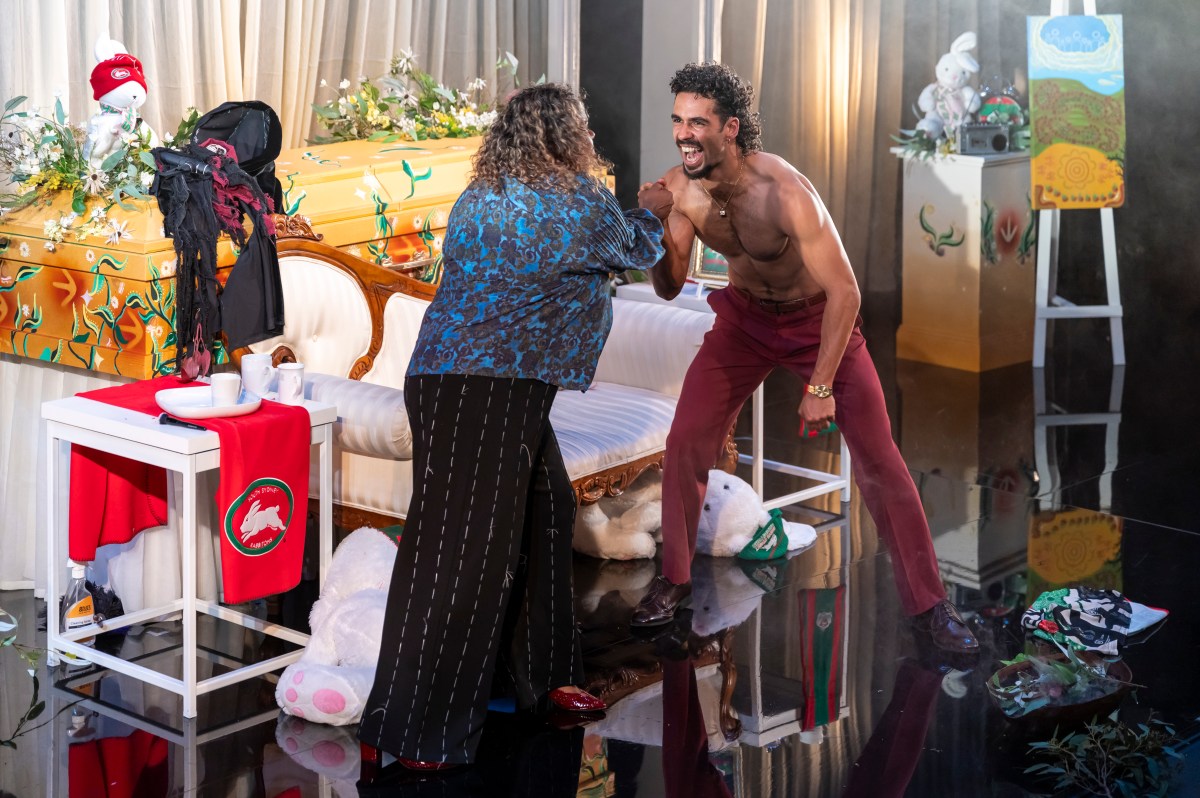
A Wake – A Woke Mob
The second play, A Wake – A Woke Mob, is penned by Maurial Spearim, an Indigenous Australian Gamilaraay and Muruwari woman who draws strength from her deep connection to Country and community. It is directed by Kamarra Bell-Wykes (Yagera/Butchulla), whose extensive theatre experience spans playwriting, direction, dramaturgy and devising.
The play unfolds in a small community hall in Brewarrina. At its heart is the family of Deadly Dave (Greg Fryer), a beloved community radio presenter and diehard footy fan, whose death leaves his loved ones grappling with profound grief. As they navigate their emotions, his professional footy player son, Greg (Zach Blampied), deeply in love with Lilly Rose, a white hippie influencer eager for family acceptance, struggles to confront the loss of his hero. Meanwhile, his daughter Merinda (Maurial Spearim), an uptight doctor, desperately tries to keep the family together, while his widow Anna (Lisa Maza AM) melodramatically wrestles with the challenge of letting go.
The story unfolds in a vibrant blend of humour and heart, as Deadly Dave’s spirit struggles to crossover due to the family feud. He resolves to reconnect with each family member, highlighting the enduring presence of ancestors in their lives. This Blak comedy masterfully intertwines themes of death, dreaming and familial love, creating a magical tapestry that celebrates life and culture with both playfulness and poignancy.
A Wake – A Woke Mob resonates powerfully with the traditions of classic funeral and wedding comedies. Much like Four Weddings and a Funeral, it juxtaposes the joy of love against the backdrop of loss, navigating the complexities of mourning while infusing the narrative with humour. The characters’ struggles with the death of their beloved father and husband mirror the exaggerated family dynamics often seen in wedding comedies, where chaos and heartfelt moments collide. The intimate setting of a community hall echoes films like Death at a Funeral, revealing the absurdity of human emotions amid tragedy.
Supporting the over-the-top delivery is a set adorned in Deadly Dave’s favourite footy colours and mascots, complemented by insane costume changes spanning zombies, giant bunnies, catholic and robes that enhance each storytelling moment. While the set remains mostly static, the minimal changes and elaborate costumes create movement that mirrors the actors’ energy. Rather than overwhelming the production, the sound and lighting design beautifully completes the overall experience.
Delightfully nonsensical in its delivery, the play offers nuanced insights into cultural knowledge and the passing down of tradition, highlighting how contemporary society often overlooks Indigenous wisdom, opting instead for appropriation born of misunderstanding. Deadly Dave’s family is a dynamic tapestry, showcasing a rich array of personalities and perspectives. The high-energy performance is brought to life by an ensemble that captures the essence of each character.
Ultimately, A Wake – A Woke Mob invites audiences to reflect on their relationships with death, grief and family, all while delivering laughter that lingers long after the curtain falls.
A Wake – A Woke Mob, Southbank Theatre, The Lawler
Writer: Maurial Spearim
Director: Kamarra Bell-Wykes
Stage Manager Liam Murray
Cast: Maurial Spearim, Lisa Maza, Greg Fryer, Zach Blampied, Jordan Barr
A Wake – A Woke Mob will be performed until 7 December 2024.
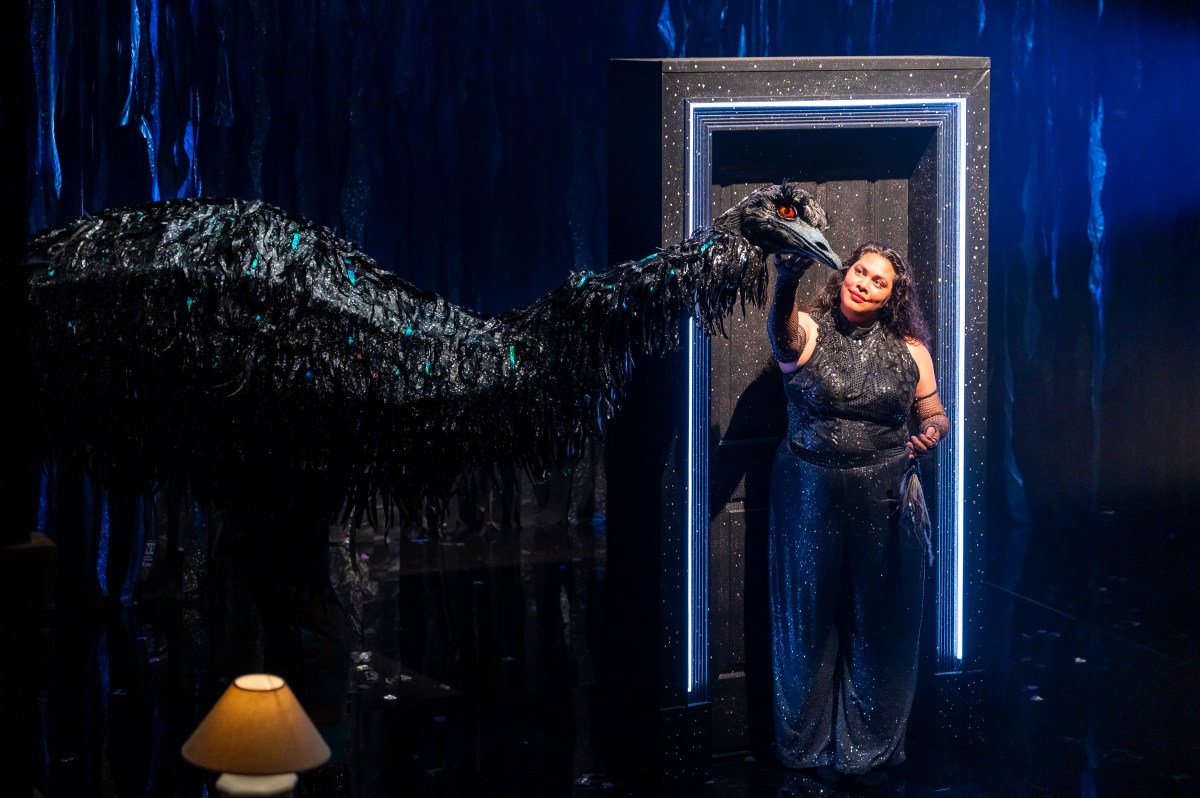
Emu and the Sun
In Emu in the Sun, playwright Phoebe Grainer weaves a poignant narrative that resonates deeply with the complexities of mental health and identity. Under the adept direction of Amy Sole, this production invites audiences into the intimate world of Etta, a young woman grappling with profound melancholy in her small Queensland bedroom. Grainer’s script is a rich composition of dance, song and storytelling, encapsulating the essence of survival and the journey towards self-acceptance.
Etta’s spiralling into despair is vividly portrayed, and the intrusion of fantastical elements – embodied by an array of dreamlike characters – serves as a powerful metaphor for confronting one’s inner demons. The production shines in its ability to balance the weight of its themes with moments of levity and magic. Each visitor to Etta’s bed is a facet of her psyche, beautifully realised by a talented ensemble. Trevor Jamieson, as the moon, brings a haunting depth to the celestial presence, while Luke Currie-Richardson’s portrayal of the dragon is both formidable and transformative. Teresa Moore injects essential humour with the perfect amount of sparkle and sass into the piece, her vibrant character providing a necessary counterpoint to the darker explorations of Etta’s mind.
The choreography and movement are integral to the storytelling, with Etta’s eventual embrace of her inner emu symbolising liberation and healing. This is not merely a tale of struggle but a profound reminder of the community and love that envelops those who feel isolated in their pain. Grainer and Sole have crafted a narrative that is both timely and timeless, echoing the experiences of many while firmly rooting itself in the Indigenous perspective.
Emu in the Sun is a breathtaking exploration of resilience and hope, reminding us that in our darkest hours, we can find light through the stories we share and the connections we forge. This is a must-see for anyone seeking a deeper understanding of the human experience.
Emu in the Sun, Southbank Theatre, The Lawler
Writer: Phoebe Grainer
Director: Amy Sole
Stage Manager: Rain Iyahen
Cast: Phoebe Grainer, Teresa Moore, Luke Currie-Richardson, Trevor Jamieson
Emu in the Sun will be performed until 7 December 2024.
Attending Blak in the Room is not just about witnessing remarkable theatre; it’s an opportunity to engage with vital First Nations’ voices and stories, making it a deeply enriching cultural experience for all. Don’t miss the chance to immerse yourself in this celebration of identity, creativity and healing.
Blak in the Room creative team
Set and Costume Designer: Dann Barber
Lighting Designer: Katie Sfetkidis
Composer and Sound Designer: James Henry
Associate Director: Miela Anich
Design Associate: Emma Holgate
Dramaturg: Jules Orcullo
Set and Costume Design Secondments: Emma Salmon and Stone Turner
Sound Design Secondment: Todd J Bennett
Assistant Stage Manager: Jenny Le
Tickets: $16-$32
